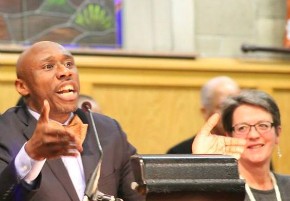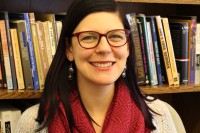Ferguson pastor, scholar address ongoing struggle against racism

Pastor F. Willis Johnson captured national attention last August after Mike Brown, an unarmed teenager, was shot and killed in Ferguson, Missouri. Johnson was photographed talking to an 18-year-old protester. He embraced the protester and moved him out of the way of police.
Since then, he has continued to engage with young activists, who remind him of the biblical figure of David.
“Every generation is challenged by situations and circumstances that are insanely intimidating and gigantic in scope,” he said. “There are Davids all around us. They are young men and women who have been anointed and prepared.”
These youth are not necessarily the ones in church confirmation classes, he said, yet they are the leaders of their generation.
“David is the youth that’s pressed to the margins of society,” Johnson said. “He ain’t scared of tear gas or rubber bullets.”
Johnson is pastor of Wellspring Church, a United Methodist congregation located near the Ferguson police department. He spoke in Chicago January 18 at an event sponsored by the Northern Illinois Conference of the United Methodist Church.
“Too many of us in church are giant tamers,” Johnson said. “But I want you to understand there are some young folk, there are some young-at-heart folk, there are some frustrated folk, there are angry folk . . . and they are also divinely directed and courageously convinced enough that they are willing, if need be, to stand and die before the giant.”
Since it was established in 2011, his church has been working on building connections between residents and municipal leaders, and they have increased their efforts since August.
Johnson was interviewed by National Public Radio in August, and among the listeners was Sally Dyck, presiding bishop of the Northern Illinois Conference of the United Methodist Church. Dyck contacted Johnson to say she was praying for him and invited him to Chicago.
Johnson was joined at the event by Pamela Lightsey, a scholar, activist, and associate dean at Boston University’s School of Theology, who has visited Ferguson several times.
Lightsey lamented the fact that so many congregations are still segregated and are not talking about racism. She sees a role for liturgy to confront racism at the congregational level.
“I believe that the foundation of systemic racism is pride,” she said. —Christian Century






